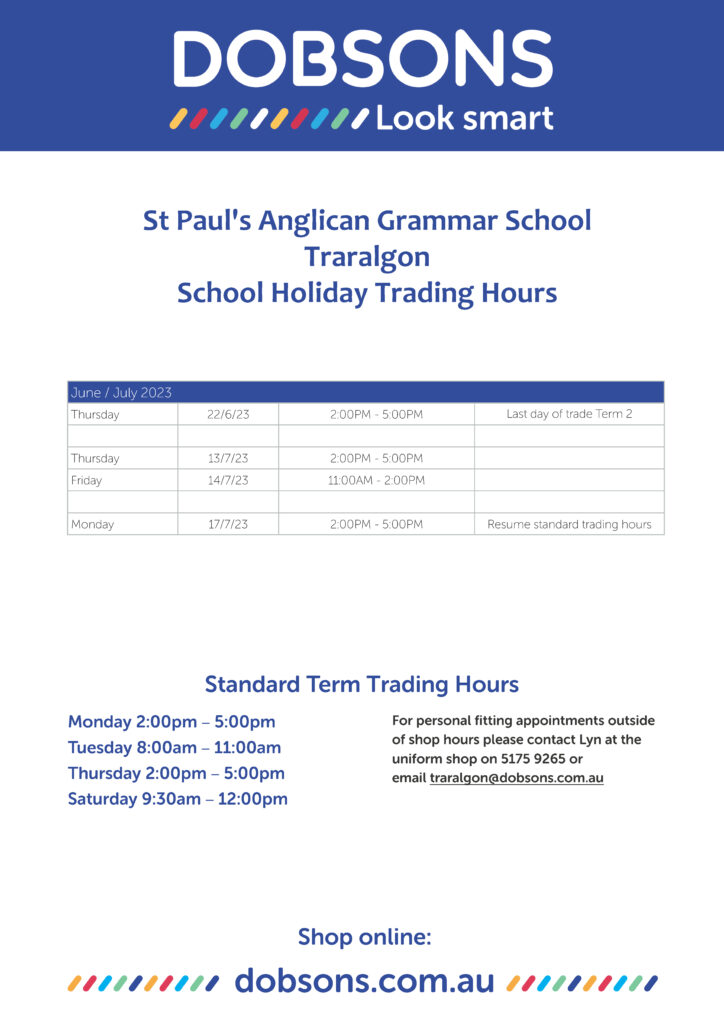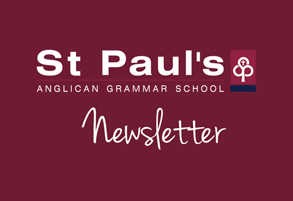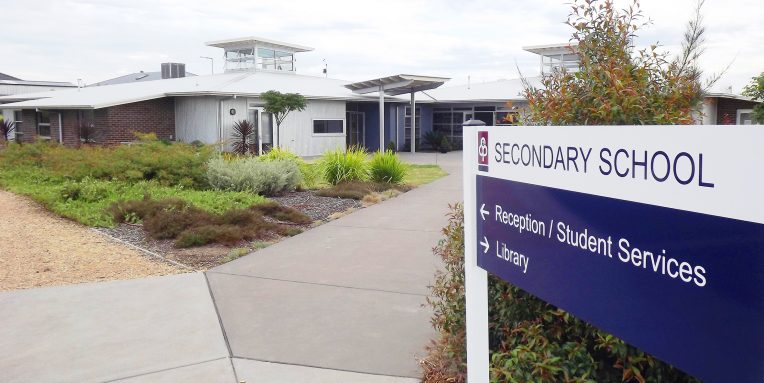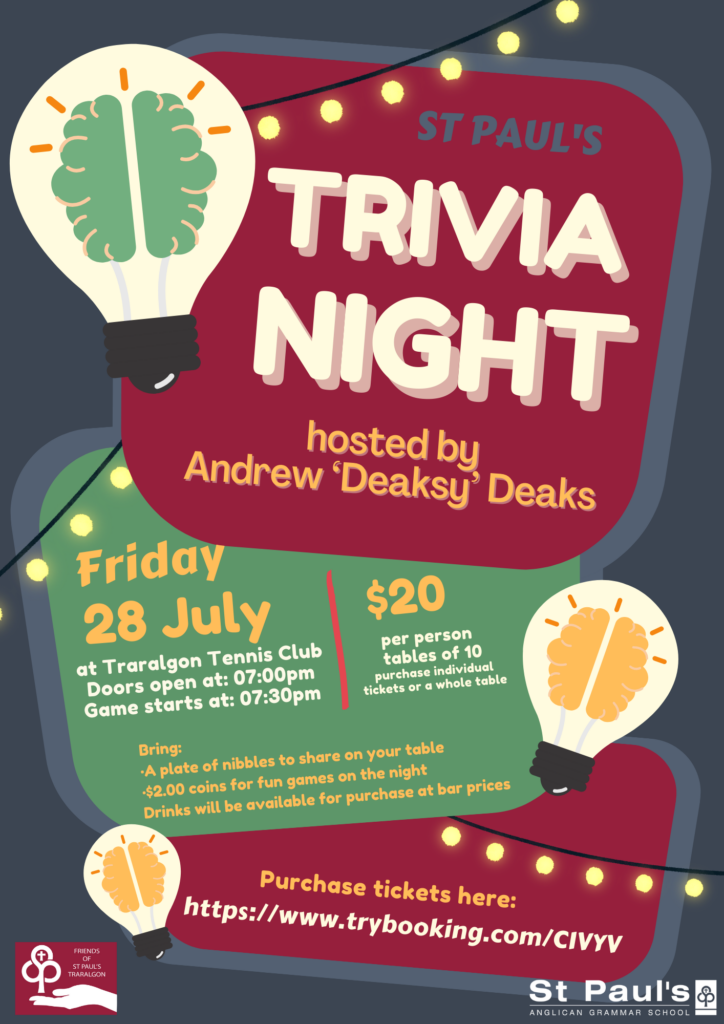In this issue
Careers News
What’s On:
• Warragul Secondary School
• Warragul Junior School
• Traralgon Secondary School
• Traralgon Junior School
CAREERS NEWS
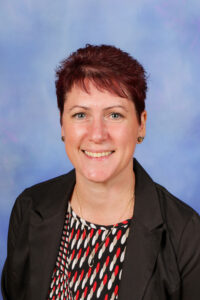
How quickly time flies as we are now almost halfway through the year. With the school holidays on our doorstep, it is a good time to check in with universities to see if they offer tours during the break so that you can have a walk around the different campuses. All the universities will also have their Open Days where you will be able to gain course-specific information, but these days are busy, loud and can be overwhelming. The smaller tours can be a nice way to see the campus and facilities and where you have time to ask your guide questions about the university. It is never too early to visit the universities as you might see or hear something that you had not considered before.
Term 3 is a busy term for our Year 12 students as they begin their applications for university and start to plan the next phase in their life journey. All other year levels will choose their subjects for 2024 which can seem daunting when thinking about the future. Start to think about what you like to learn and why, and maybe what you might like to do when you first leave school. This might help guide your thinking when deciding what subjects you would like to choose for next year.
Take time over the break to relax, read a good book, go for a walk or spend time with friends/family/pets so you can come back into Term 3 feeling refreshed and ready for the term.
“Setting goals is the first step in turning the invisible into the visible.” – Tony Robbins
Sarah Luck
Head of Careers
sluck@stpaulsags.vic.edu.au
Years 9 and 10 Students

Camp SEEK
Cremorne, Melbourne
Camp Seek is a STEM-focused learning and immersion program for Years 9 and 10 female and non-binary young people (aged 14–16 years) taking place during the September school holidays. Participants will spend four days at SEEK headquarters in Cremorne and be introduced to a future career within a tech-focused business. The camp provides learning, mentorship and an introduction to the innovative business world through a practical, fun and collaborative four-day program.
Participants will learn from subject matter experts about their career journeys in tech, develop their coding, learn about real-world problem-solving and put it all to use in a Create-a-Thon project with fellow Camp SEEKers.
25-28 September
For further information and to register your place, visit Camp SEEK
Years 11 and 12 Students
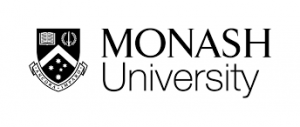 Business Explorer Program
Business Explorer Program
Monash University is running a free business explorer program for students in Years 11 or 12 who are keen to explore course and career options in business. The next event will run in September at the Clayton campus. You will choose to participate in three hands-on sessions from the following course areas:
- Accounting
- Banking and finance
- Analytics, statistics and actuarial studies
- Economics
- Management
- Marketing
- Entrepreneurship
You can register your interest in attending the September event via www.monash.edu/business/business-explorer
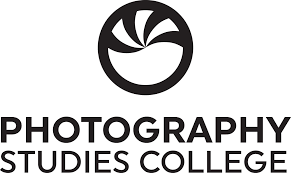
Free photography workshops
Photography Studies College (PSC) is hosting a free workshop specifically tailored for Years 11 and 12 students during the upcoming school holidays at their South Melbourne studio. Students will explore experimental photography and have an opportunity to use the equipment and facilities. Lunch will be provided.
Date: Wednesday 28 June
Time: 11:00 am – 2:00 pm
Venue: 37-47 Thistlethwaite Street, South Melbourne
To register, visit: Winter Workshops
Year 12 Students
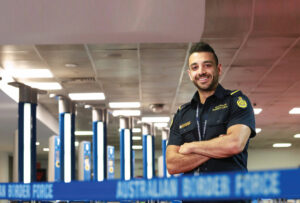
Australian Border Force
Year 12 graduates have the opportunity to apply for the Border Force Officer Recruit Training (BFORT) program. This 12-month program prepares you for a role in the Australian Border Force.
During your initial 12-month training course, you will be paid $54,439 (plus 15.4% superannuation). When you successfully complete the training course, you will become an APS3 General Duties Border Force Officer.
You will play a vital role in protecting our borders. Bookmark this webpage to check for upcoming application dates, ABF Careers
Compulsory University Entry Tests

Initial teacher education – Victoria
Students planning to apply for initial teacher education courses in Victoria for the 2024 intake are required to sit the Casper test. Casper is an online, open-response situational judgment test (SJT). It asks what you would do in a tough situation, and more importantly, why. This helps to determine the behavioural tendencies of applicants pursuing people-centred professions.
Students will be required to take the following test: CSP 10409 – Australian Undergraduate Teacher Education. During the registration process, you will select the universities you would like your results sent to. Register for the test via https://acuityinsights.app/casper/
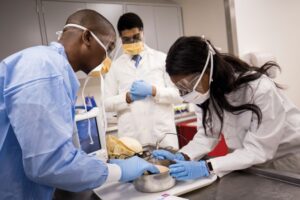
Medicine and Dentistry
By now, Year 12 students applying for medicine and/or dentistry courses that require the UCAT ANZ should have completed the registration and booked a test date. For information on the application process and key dates for Victorian, NSW and ACT courses, please visit: UCAT
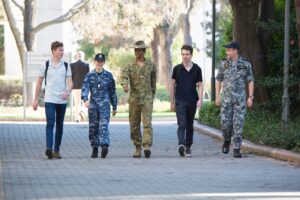
Australian Defence Force Academy (ADFA)
Students planning to apply for ADFA are encouraged to start planning as soon as possible. There is a dual application process and applicants will need to be mindful of key dates. Read through the ‘how to apply’ section on the ADFA website and record key dates and tasks. The process will take several months, ADFA Careers
Open Days and Information Sessions
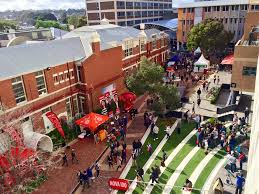
Now is the perfect time to identify institutions you would like to visit, record their open day dates on a calendar, register for the event and complete a personalised planner on the website. If you have time, try and attend information sessions on topics like pathways, scholarships, accommodation and overseas exchange programs. Do not just pick a course at an institution without visiting the campus as you potentially will be spending several years studying there and spending tens of thousands of dollars on your course and accommodation so it is worth making the effort.
Tips for Parents/Guardians
Victoria University has developed an Open Day guide for parents/guardians, read it here: Open Day Tips
A-Z of Open Days
Careers with STEM has developed a handy guide that covers everything from how to prepare, what a campus tour involves and who you will meet while you are there, read it here: The A-Z of Open Day
Suggested Questions
If you are unsure what to ask on the day, Victoria University has developed some questions you can ask:
- Are there any prerequisite subjects I need to study for this course?
- What study scores/ATAR do I need to achieve to get into this course?
- Do I need to attend an audition, have an interview, or present a folio as part of the selection process?
- Are there any other ways into this course other than through a VTAC application?
- If I cannot get into this course, is there a similar course at this institution I can apply for?
- Can I study majors and/or minors in this course?
- How many hours per week are spent in class and can I study part-time?
- Can I defer the course?
- What kind of jobs do graduates of this course generally get?
- Are there any scholarships available?
Open Day Perspectives
Parent perspective: Written by Shona, parent of Charlotte.
I attended the 2022 Swinburne University Open Day with Charlotte. The day was exciting and informative. We learnt about the course Charlotte was interested in and the different pathways she could take in her tertiary education. Charlotte also had an opportunity to speak directly with the lecturers and current students studying the course.
For me, I loved the reassurance of taking a tour of the campus to learn about the residential accommodation options, student benefits including onsite medical and health services, campus security, parking/transport, and student support services. Getting to chat directly to current students who have come from regional areas was also a plus.
The whole experience was really beneficial and it was reassuring as a parent to be there in person. I am really excited for Charlotte and what uni life has to offer her.
Student perspective: Written by Charlotte
I started off by going to a talk about the course I was interested in and learnt about potential majors. The talk included how the course is structured and possible career paths that students can take. I was able to meet my future lecturers and department leaders.
I also went to the pop-up stall for my course and was able to speak to current students and ask questions. There were activities, free food and information stalls everywhere, with incredibly kind and welcoming people to answer all of my questions.
However, the best thing I got out of going to an open day was the ability to see what Swinburne is all about. I got to tour the campus and student accommodation and see which apartment style would be the best fit for me next year.
Going to an open day not only gave me the answers to many of the questions I had about living on campus and uni life, but also gave me peace of mind that I was choosing the best course and university for me.
 Monash University Campus Tours
Monash University Campus Tours
These events are for prospective students and their families and will be held in July on the dates listed below. They are a great opportunity to tour campuses, speak to course advisers and meet current students. To register or find other tours and information sessions visit: www.monash.edu/discover/events
Monday 3 July, 10:00 am – 11:30 am or 2:00 pm – 3:30 pm: Clayton campus
Tuesday 4 July, 10:00 am – 11:15 am: Peninsula campus
Tuesday 4 July, 2:00 pm – 3:15 am: Caulfield campus
For a current list of all open days visit the Careers page on MyStPauls
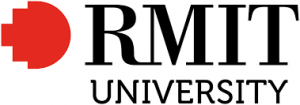
RMIT University Campus Tours
Are you a secondary school student who wants to find out more about studying at RMIT? Head along to the RMIT tours during the school holidays and take a look around their City, Brunswick or Bundoora campuses. In the upcoming school holidays, RMIT will be hosting campus tours at City, Brunswick, and Bundoora.
Browse Campus tours RMIT University and register for one or more.
A Day at Melbourne
Years 11 and 12 students are invited to experience a taste of life at The University of Melbourne by attending the Parkville campus for A Day at Melbourne on Wednesday 28 June.
Throughout the day you will have the chance to take part in two areas of study workshops of your choosing, sit in on a panel of current students to hear about their experiences, speak to staff one-on-one about your study interests, discover the broad range of student clubs and societies and participate in student accommodation tours.
Registrations close Tuesday 27 June.
Places are strictly limited and will fill quickly, register via The University of Melbourne
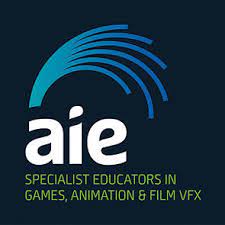
AIE Industry Experience Day
This is a great opportunity for students in Years 10, 11 and 12 to learn about the local and international game development, 3D animation and visual effects industries. Students will get the opportunity to learn about the different pathways to get into the industry, what should be in a portfolio and will be able to get creative in practical workshops using industry-standard 3D animation and game development tools.
The sessions are run by industry professionals who have worked on some blockbuster games and films. Everything is provided for you to participate in the hands-on workshops and you will be using the same software that is used in the industry.
Tower 4, Atrium Level, World Trade Centre, 18-38 Siddeley Street, Melbourne
Wednesday 5 July
For further details and to register visit: AIE events
Studying Arts at University
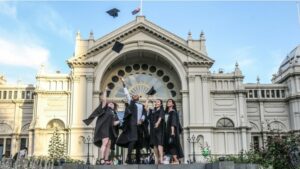
There is often a debate about the value of an Arts Degree and what kind of role an Arts Graduate could find in industry. The list of roles is quite varied and includes:
- Teaching and educational administration
- International aid and trade agencies
- Arts production and management
- Public service and social welfare agencies
- General management and administration (local and global)
- Communications, publishing, media and public relations
- Tourism and hospitality
One of the very important things for students to note is that an Arts student learns skills that are very transferrable in industry. These include communication skills, critical thinking and reading skills, analytical skills and research skills – browse Career FAQS – What to do with your Arts Degree to learn more.
The University of Melbourne also has some useful information at this link – Bachelor of Arts: Where will this take me?
Subject Selections
Careers with STEM has written an article looking at the 10 most popular university courses (NSW) for the 2023 intake and what STEM electives they need. This is a fascinating look at how STEM subjects can prepare you for courses in study areas such as medicine, arts, computer science and business. Read the article here: STEM subjects
Careers in Psychology

Would you like to become a psychologist? You will need to start your education by studying a three-year bachelor’s degree or a four-year integrated bachelor’s and honours program with an Australian Psychology Accreditation Council (APAC) approved major in psychology, https://psychologycouncil.org.au/
Cool facts about psychology:
- It takes at least six years to become a generalist psychologist and another two to four years to become a specialist.
- You can study a psychology major in a degree that is focused on your interests, such as health, humanities, science, business etc.
- In some degrees, you can study a second specialisation. Examples of study areas include criminology, disability studies, marketing, neuroscience, health promotion, nutrition etc.
- There is maths in psychology degrees such as statistics and correlation! It is highly advisable to study senior level maths at school.
If you do not want to become a psychologist, you can complete an undergraduate degree with a psychology major and then complete graduate studies in an area that is focused on human behaviour, such as social work, career development/counselling, marketing, human resource management, criminology etc.
Specialist psychology fields
Once you complete your six years of study and training and have registered as a generalist psychologist, you can pursue training in an area of psychological practice, such as:
- Clinical neuropsychology
- Clinical psychology
- Community psychology
- Counselling psychology
- Educational and developmental psychology
- Forensic psychology
- Health psychology
- Organisational psychology
- Sport and exercise psychology
Careers in psychology
Deakin University has developed an excellent website showcasing different careers in psychology, visit: Psychology careers
Research psychology courses
The pathway to becoming a psychologist is complex and it is important to be aware of the grades and hurdles required to move between each stage. Please speak to me to map out the best courses for you. You can research courses via www.courseseeker.edu.au
Degrees studying animals
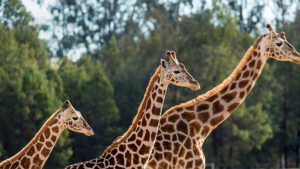
If you love animals, why not turn your passion into a career and consider any of the following degrees:
| INSTITUTION | COURSE NAME | VCE PREREQ’S | MAJOR STUDIES IN 2023 |
| DEAKIN UNIVERSITY
ATAR: 60.20 (Melbourne)
ATAR: 66.45
ATAR: 75.20
ATAR: 65.50 (Geelong) |
Environmental Science (Environmental Management and Sustainability) | Units 3 and 4: a study score of at least 25 in English (EAL) or at least 20 in English other than EAL.
|
Applied data analytics, Biology, Bushfire management, Catchment management, Coastal and marine management, Conservation biology/ecology, Ecological studies, Ecology, Ecosystem management, Ecotourism, Environmental health, Environmental impact assessment, Environmental management, Environmental policy and planning, Environmental project management, Environmental protection, Environmental science, Environmental social science, Global engagement, Indigenous studies, Land management, Natural resources management, Nature conservation, Parks and reserve management, Plant and animal biology, Pollution control, Professional practice, Research methods, Resource efficiency, Science, Sustainability, Waste management, Water resources management, Wildlife management. |
| Marine Science | Units 3 and 4: a study score of at least 25 in English (EAL) or at least 20 in English other than EAL. | Aquaculture sciences, Biology, Chemistry, Fisheries and aquaculture, Global engagement, Indigenous studies, Marine biology and ecology, Modelling, Ocean and coastal processes, Ocean fisheries, Physics, Science quantitation, Sustainable marine management. | |
| Environmental Science (Wildlife and Conservation Biology) |
Units 3 and 4: a study score of at least 25 in English (EAL) or at least 20 in English other than EAL.
|
Agricultural environmental and related studies, Animal and plant biology, Animal husbandry, Applied data analytics, Biology, Botany, Bushfire management, Conservation biology/ecology, Ecological studies, Ecosystem management, Environmental science, Global engagement, Indigenous studies, Land and water management, Landscape ecology, Natural resource management, Park and wilderness management, Plant ecology, Science, Vegetation and wildlife management, Wildlife conservation and ecology, Wildlife management, Zoology. | |
| Zoology and Animal Science | Units 3 and 4: a study score of at least 25 in English (EAL) or at least 20 in English other than EAL.
|
Animal behaviour, Animal biochemistry, Animal biology, Animal communication, Animal diversity, Animal navigation, Animal welfare, Animals and climate change, Applied data analytics, Conservation genetics, Disease ecology, Ecology, Ecophysiology, Evolutionary biology, Genetics, Indigenous studies, Marine biology, Ornithology, Physiology, Science, Sensory ecology and neurobiology, Wildlife disease, Wildlife ecology and conservation, Wildlife management, Zoology. | |
| FEDERATION UNIVERSITY ATAR: 49.90 (Berwick) ATAR: 38.75 (Berwick) |
Environmental and Conservation Science | Units 3 and 4: a study score of at least 20 in any English; Units 3 and 4: a study score of at least 20 in any Mathematics or at least 20 in any Science. | Environmental and Conservation Science. |
| Veterinary and Wildlife Science | Units 3 and 4: a study score of at least 20 in any English; Units 3 and 4: a study score of at least 20 in one of any Mathematics or any Science. | Veterinary and Wildlife Science. | |
| LA TROBE UNIVERSITY ATAR: 60.90 (Melbourne) ATAR: 55.85 (Melbourne) ATAR: 55.75 (Melbourne)
ATAR: 68.60 (Melbourne)
ATAR: 75.35 (Melbourne) |
Animal and Veterinary Biosciences | Units 3 and 4: a study score of at least 25 in English (EAL) or at least 20 in English other than EAL. | Animal and Veterinary Biosciences. |
| Biological Sciences | Units 3 and 4: a study score of at least 25 in English (EAL) or at least 20 in English other than EAL. | Biochemistry (Melbourne only), Botany, Ecology, Genetics, Human physiological sciences, Microbiology, Zoology. | |
| Biological Sciences (Zoology Major) |
Units 3 and 4: a study score of at least 25 in English (EAL) or at least 20 in English other than EAL. | Zoology | |
| Veterinary Nursing | Units 3 and 4: a study score of at least 25 in English (EAL) or at least 20 in English other than EAL; Units 3 and 4: a study score of at least 20 in one of Biology, Chemistry or any Mathematics. | Veterinary nursing. | |
| Wildlife and Conservation Biology | Units 3 and 4: a study score of at least 25 in English (EAL) or at least 20 in English other than EAL. | Wildlife and Conservation Biology. |
Scholarships

Why should I apply for scholarships?
Scholarships can help unlock doors to higher education, empowering you to pursue your dreams without the burden of financial constraints. Scholarships could provide financial aid, covering tuition fees, accommodation expenses, textbooks and sometimes even living allowances. They are awarded to students for a wide variety of reasons, including academic excellence, leadership potential, community involvement and to help deserving students from underrepresented backgrounds.
How do I apply?
Most scholarship applications these days are done online, so you will need access to a computer or tablet and the internet. While each scholarship may have specific requirements, generally you will need to submit an application form, academic transcripts and a personal statement outlining your achievements, aspirations and community involvement. Remember to highlight your unique experiences, cultural heritage, and resilience in overcoming challenges. Do not forget, you can always seek assistance from mentors, teachers, or scholarship support services if you need help putting your application together.
Dream big
Scholarships can provide a stepping stone towards fulfilling your dreams, whether that is becoming a lawyer, an engineer, an artist, or a leader in your community. Take advantage of these opportunities, be ambitious, and don’t be afraid to dream big.
Scholarships for Indigenous students
There are lots of government, university and community scholarships out there to support Indigenous students. We have listed a few below:
- The Smith Family Indigenous Youth Leadership Program: provides scholarships and leadership opportunities to young Indigenous Australians, with a focus on Indigenous youth from communities in very remote areas of the country or regional communities.
- ANU National Indigenous University Scholarship: acknowledging the academic excellence of Indigenous students in secondary school studies and providing assistance with costs related to tertiary studies.
- Bendigo Bank Indigenous Scholarship Program: for students who identify as Aboriginal and/or Torres Strait Islander looking to start their first year of tertiary study.
- AMA Indigenous Medical Scholarship: for Indigenous medical students who want to study medicine but may not have the financial means to realise their dream.
- Rio Tinto Indigenous Scholarship Program: financial support for Indigenous students in WA studying for their first undergraduate degree.
- Indigenous Student Success Program: provides funding to universities so they can offer a variety of scholarships and support services dedicated to Indigenous students.
You can find more blogs about scholarships and search for opportunities on the Study Work Grow website here.
University Snapshot – The University of Melbourne
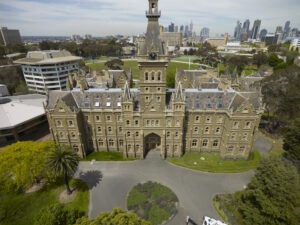
- Established in 1853, The University of Melbourne (UoM) makes distinctive contributions to society in research, learning and teaching and engagement.
- UoM is consistently ranked among the leading universities in the world, with international rankings of world universities placing it as number one in Australia and number 34 in the world (Times Higher Education World University Rankings 2022), and number one in the world in numerous subjects (QS World Rankings by subject 2022): rankings.
- The University of Melbourne has one primary campus – Parkville – north of the Melbourne CBD and associated campuses including Southbank, and rural campuses: Campuses and Facilities.
- UoM offers 17 undergraduate degrees and over 250 graduate courses – Courses at UoM. Currently 50 per cent of students study undergraduate courses and the other 50 per cent are in graduate programs.
- UoM offers a small range of Graduate Degree Packages whereby students can bundle an undergraduate degree offer with an offer for a place in one of the specialised, professionally accredited graduate school programs.
- The Bachelor of Design offers 13 majors, including Architecture, Civil Engineering Systems, Computing and Software Systems, Construction, Digital Infrastructure Engineering Systems, Graphic Design, Landscape Architecture, Mechanical Engineering Systems, Performance Design, Property, Spatial Systems, Urban Planning and User Experience Design.
- The university has over 200 clubs and societies, which play an integral part in many students’ university experience: Student Clubs and Societies.
- The university encourages students to make practical learning a part of their Melbourne experience, these include internships and cadetships, leadership opportunities and volunteering.
- Overseas study programs are offered to students and they are encouraged to study part of their degree in an international setting – Study Overseas.
- The University of Melbourne offers numerous and generous undergraduate scholarships to high-achieving students, as well as numerous equity scholarships. Recently introduced scholarships are the Melbourne Principals’ Scholarship and Hansen Scholarship.
- UoM also has the Access Melbourne program aimed at students who have found secondary school a challenge and whose circumstances have prevented them from achieving their best: Access Melbourne.
- Students have access to a wide range of Student Services, which include – Student Services including a Careers Centre: Careers Centre.
- UoM offers a Guaranteed Entry to Graduate pathways: Guaranteed Entry to Graduate pathways.
- UoM has numerous residential colleges for its undergraduate students: Student Accommodation.
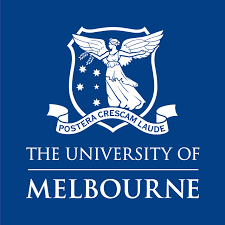
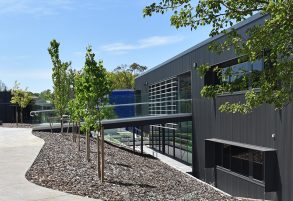
WHAT’S ON Warragul Secondary School
JUNE 23 June End of Term 2, 2:10 pm finish JULY 18 July Term 3 Commences Champions Cup, State Basketball Centre, 9:00 am to …
WHAT’S ON Warragul Secondary School
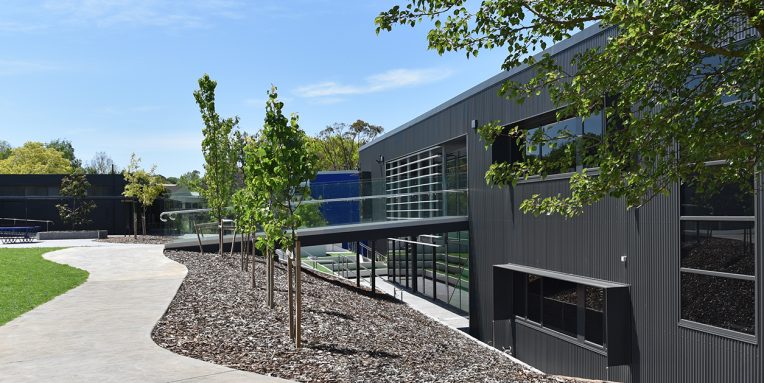
JUNE
23 June End of Term 2, 2:10 pm finish
JULY
18 July Term 3 Commences
Champions Cup, State Basketball Centre, 9:00 am to 5:00 pm
19 to 21 July Year 10 Conference, Phillip Island
20 July SEISA Winter Sport, Intermediate/Senior, Round 1 (BYE)
21 July Sport Aerobics Training, Warragul Secondary School Gymnasium and Dance Studio, 6:55 am to 8:15 am
Senior Formal, Year 11 and Year 12 students, Moe Racing Club, 7:00 pm to 10:30 pm
23 July AusCycling School Mountain Bike Series – Round 2, Lysterfield
25 July Job Skills Expo, Year 9 students, Lardner Park, 10:40 am to 1:00 pm
Studio Concert, Select Performing Arts students, DT Parker Centre and Science Centre Lecture Theatre, 5:00 pm
27 July SEISA Winter Sport, Intermediate/Senior, Round 2
28 July Sport Aerobics Training, Warragul Secondary School Gymnasium and Dance Studio, 6:55 am to 8:15 am
Gymnastics Training, Warragul Gymnastics Centre, 7:00 am to 8:00 am
Celebrating Families Day, Year 9 students, Year 9 Centre, 1:30 pm to 3:10 pm
31 July Senior Information Evening, Year 9 Centre, 7:00 pm to 9:00 pm
WARRAGUL SECONDARY SCHOOL OFFICE HOLIDAY HOURS
Monday 26 June to Friday 30 June, 10:00 am to 3:00 pm
Monday 3 July to Friday 7 July, 10:00 am to 3:00 pm
Monday 10 July to Friday 14 July, 10:00 am to 3:00 pm
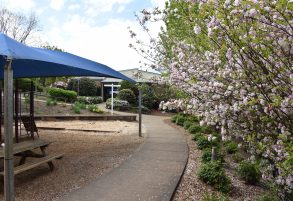
WHAT’S ON Warragul Junior School
JUNE 23 June End of Term 2, 2:20 pm finish JULY 18 July Term 3 Commences 19 to 21 July Year 4 Camp …
WHAT’S ON Warragul Junior School
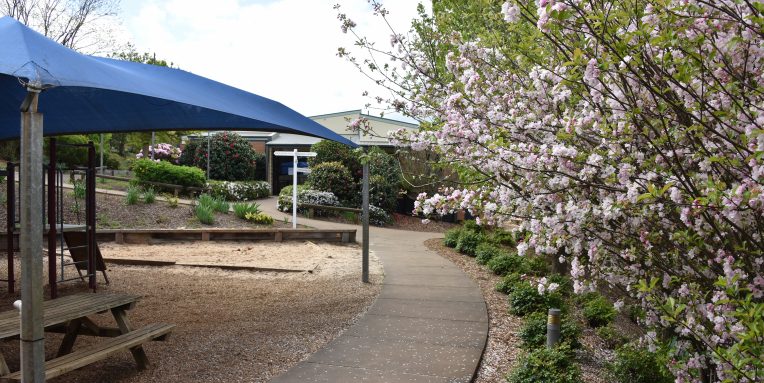
JUNE
23 June End of Term 2, 2:20 pm finish
JULY
18 July Term 3 Commences
19 to 21 July Year 4 Camp
AUGUST
2 to 4 August Family Snow Sports Camp
7 August Parent Prayer Group
18 August Bullying No Way: Nation Day of Action
Pre-Prep to Year 6 Incursion, Sean Choolburra
WARRAGUL JUNIOR SCHOOL HOLIDAY OFFICE HOURS
Monday 26 June: OPEN 10:00 am to 3:00 pm
Tuesday 27 June to Monday 10 July: CLOSED
Tuesday 11 July to Friday 14 July: OPEN 9:00 am to 3:00 pm
Monday 17 July: OPEN 9:30 am to 4:30 pm
Tuesday 18 July: Term 3 commences
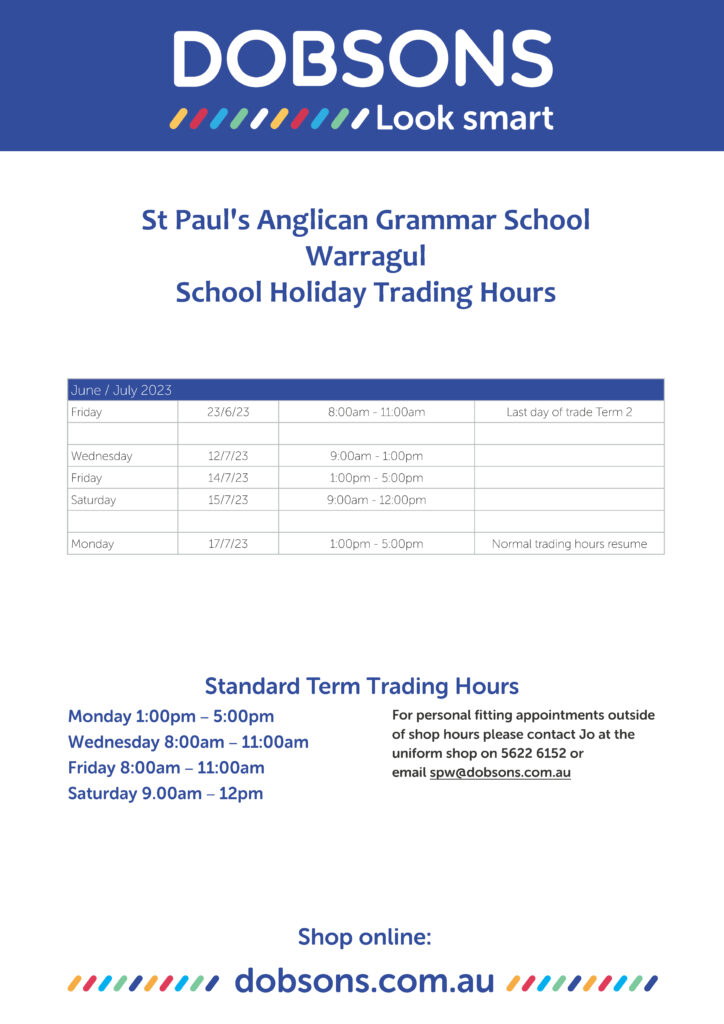
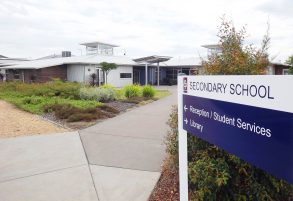
WHAT’S ON Traralgon Secondary School
JUNE 23 June End of Term 2, 2:10 pm finish JULY 17 July Student Free Day 18 July Term 3 Commences 19 to 21 …
WHAT’S ON Traralgon Secondary School
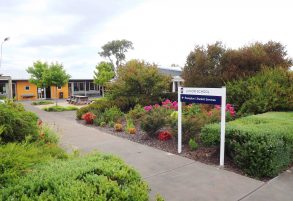
WHAT’S ON Traralgon Junior School
JUNE 23 June End of Term 2, 2:20 pm finish JULY 18 July Term 2 Commences 19 July Region Winter Sports AUGUST 1 …
WHAT’S ON Traralgon Junior School
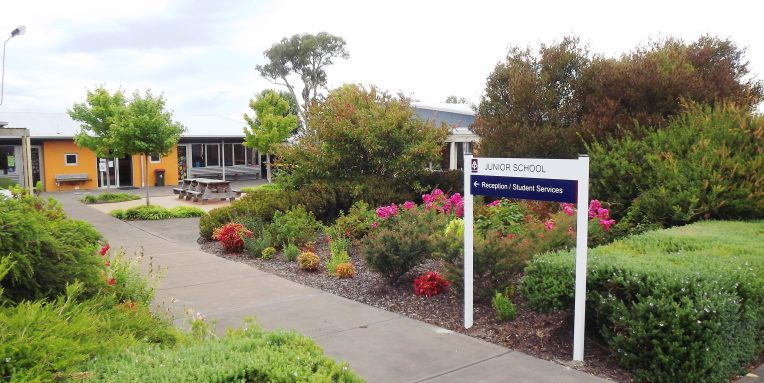
JUNE
23 June End of Term 2, 2:20 pm finish
JULY
18 July Term 2 Commences
19 July Region Winter Sports
AUGUST
1 August District Summer Sports
7 August Science Week
8 August Prep 100 Days of School
18 August National Day of Action Against Bullying
21 August Book Week
23 August Book Character Parade
Parent Student Teacher Interviews (PSTIs), 3:45 pm to 8:00 pm
24 August Parent Student Teacher Interviews (PSTIs), 3:45 pm to 6:00 pm
28 to 30 August Years 3 and 4 Camp
31 August Fathers’ Evening Event
SEPTEMBER
1 September FOSP Father’s Day stall
7 September Musical
13 September Classroom Expos
14 September RUOK Day
15 September End of Term 3, 2:20 pm finish
